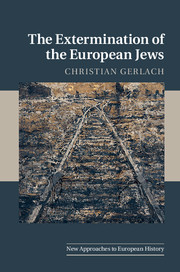Book contents
- Frontmatter
- Contents
- List of tables
- Acknowledgments
- List of abbreviations
- 1 Introduction
- Part I Persecution by Germans
- Part II Logics of persecution
- 7 Racism and anti-Jewish thought
- 8 Forced labor, German violence and Jews
- 9 Hunger policies and mass murder
- 10 The economics of separation, expropriation, crowding and removal
- 11 Fighting resistance and the persecution of Jews
- Part III The European dimension
- Bibliography
- Index
9 - Hunger policies and mass murder
from Part II - Logics of persecution
Published online by Cambridge University Press: 05 March 2016
- Frontmatter
- Contents
- List of tables
- Acknowledgments
- List of abbreviations
- 1 Introduction
- Part I Persecution by Germans
- Part II Logics of persecution
- 7 Racism and anti-Jewish thought
- 8 Forced labor, German violence and Jews
- 9 Hunger policies and mass murder
- 10 The economics of separation, expropriation, crowding and removal
- 11 Fighting resistance and the persecution of Jews
- Part III The European dimension
- Bibliography
- Index
Summary
Food was a scarce commodity of major political importance during World War II. Unlike in the European Union of today, there were no large European grain surpluses, butter mountains and wine lakes. Instead, Europe – and especially its chief industrial powers, Germany and Great Britain – depended on large overseas imports. However, Germany, her allies, and the countries she occupied, had these deliveries cut off from late 1939 by the British naval blockade. This resembled the situation in World War I, which is why German leaders – and especially Hitler – worried about it. They believed Germany had lost that war because of a breakdown of morale and political willpower in 1918, and that famine (which was supposed to have claimed the lives of 300,000 Germans) had played a crucial role in this collapse, as well as mobilizing proletarians for the 1918–19 revolution. They wished to prevent a repeat of this at all costs. Nazi leaders blamed hunger in Europe from 1939 to 1945 on the Allied blockade, which was allegedly inspired by Jews who were, thus, responsible for the fact that Aryan children starved to death, as Hitler wrote in his testament. Before the war, Hitler had already emphasized that territorial expansion was necessary for German food autarchy. In Mein Kampf he had portrayed starvation as a crucial personal experience and a great threat to the German nation and its culture.
The potential for increasing domestic food production to replace lost imports was low. Food production markedly decreased in most countries, as one would expect, due to a lack of agricultural inputs. The supply of labor fell as the military recruited men from the countryside; less machinery could be used because of the lack of fuel and the military's requisitioning of tractors; horses were also requisitioned; less mineral fertilizer was available since it was produced from phosphate and nitrogen, which were needed for making ammunition; and natural fertilizer was scarce because the lack of imported feed grains and forage meant that the number of livestock had to be reduced as pasture was converted to cropland. The move from animals to grain for human consumption, and from grain to potatoes or sugar beet (which were more calorie-efficient), could only remedy the problem in part.
- Type
- Chapter
- Information
- The Extermination of the European Jews , pp. 215 - 260Publisher: Cambridge University PressPrint publication year: 2016



